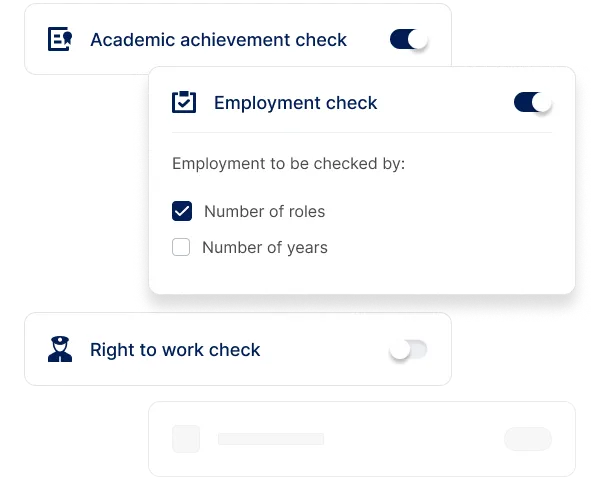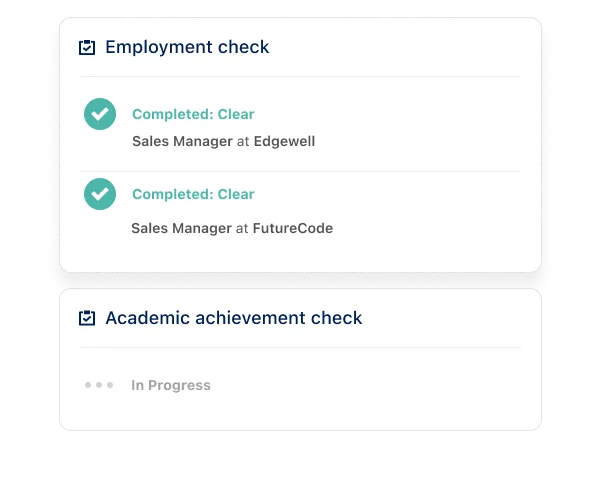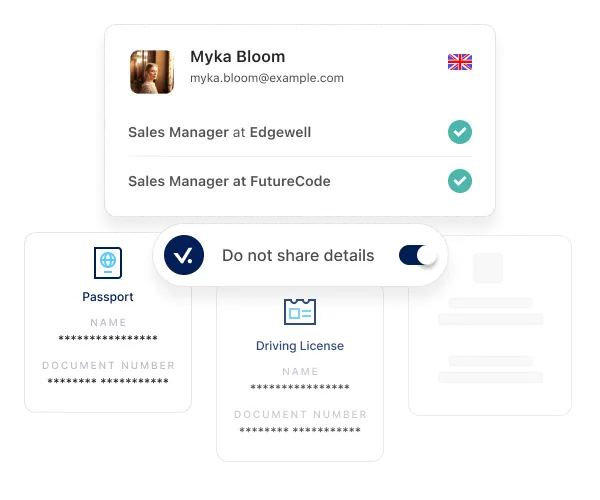Shine the spotlight on unexplained periods in a candidate’s employment history

Employment gap checks - get the full picture
Employment gaps can happen for all kinds of reasons. Most of the time, a break can be down to travel, ill health, or other personal circumstances. Sometimes, there can be other reasons which may affect your hiring decisions.
This option enables us to investigate any gaps recorded as part of an employment check.
Whether it’s a recent job loss, or something else, our findings will tell you the reason behind the unexplained period.
Our employment gap check includes:
- Any recent job loss
- Unexplained gaps that are three months or longer
- Unemployment in between jobs
Trusted by the world's best workplaces






PROVEN
.png)
.png)




and Loved by reviewers
Easy
Reduce risk
No lock-in
Global checks
24/7 support
Faster time to hire
With our award-winning software, we’re the number one choice for leading brands and workplaces all over the world.
While previous employers can shine a light on your candidate, it’s the unexplained gaps in between roles that can raise the bigger questions.
As part of our employment gap verification, we can bundle them in with reference checks and together they're known as Employment Background Verification.
How it works



Related checks
FAQs
The results from a background are compiled into a report that includes any gaps in employment or areas of concern that require attention. Employment History Checks are sometimes bundled with Reference Checks and together they're known as Employment Background Verification.
Employers are becoming more and more interested in the gap year experience. They are looking for creative, innovative, and passionate employees that have the skills to take on a challenge. A recent study has found that employers care about gap years, but they also want to know what skills were gained from the experience. There is a strong need for employees who can think outside of the box and are willing to take on new challenges.
Employers will always look at gaps in employment and it is important for the applicant to be transparent about this. It is important to highlight the reasons for the gaps in employment and provide evidence that there were not other unexplained issues with the applicant's work history. For example, if someone was a stay-at-home parent for a few years, they should ensure that they mention this when applying for a job, so that employers understand that there are no other issues with their work history.
The most common form of reference check is to secure written confirmation from a professional referee or a character referee who knew the candidate during the period in question. The referee is called a gap ref.
The acceptable gaps depend on the situation. A gap of a few months may be acceptable if it was due to an illness or family reasons, but the gap may require further explanation if it was due to unemployment or addiction for example.
The hiring process is a two-way street. The employer should be able to trust the candidate and the candidate should be able to trust the employer. If a candidate has employment gaps on their resume, it is important that they are honest about them and provide a good explanation as to why they were not working during this time. A candidate with an employment gap might be more likely to accept a lower salary in order to get back into the workforce. Employers should keep this in mind when evaluating candidates with employment gaps on their resume.
It is acceptable to ask an applicant about a gap in their employment history if it's relevant to the position, and they are open to clarify any discrepancies.
There are plenty of possible problems a background check may reveal in a person, including a criminal history, an education discrepancy, poor credit history, damaged driving record, false employment history and more.
Due to the decline in personal applicant-data availability, recruiters may need to solve gaps with previous employers or criminal records. A gap analysis gives more context on what happened during this time between work engagements and will allow you to make an informed decision.
In today’s competitive job market, employers often ask applicants about gaps in their employment history. They are trying to find out what the applicant did during that period. Some employers may be concerned about any unexplained gaps, but it is important to note that there can be many reasons for a gap in employment history such as illness, maternity leave, training / education, or even a sabbatical.
Some employers don't like gaps in employment because they think it might be a sign that the candidate may move around after only short tenures of employment. Gaps in employment can also give the impression that the applicant was fired or laid off from his/her previous job, although organizational restructures have become more common over the last 10 to 20 years. The employer may also not want to hire someone who has been unemployed for a long time, as this could mean that they don't have the recency of experience and skills for the position.
Transform your hiring process
Request a discovery session with one of our background screening experts today.






